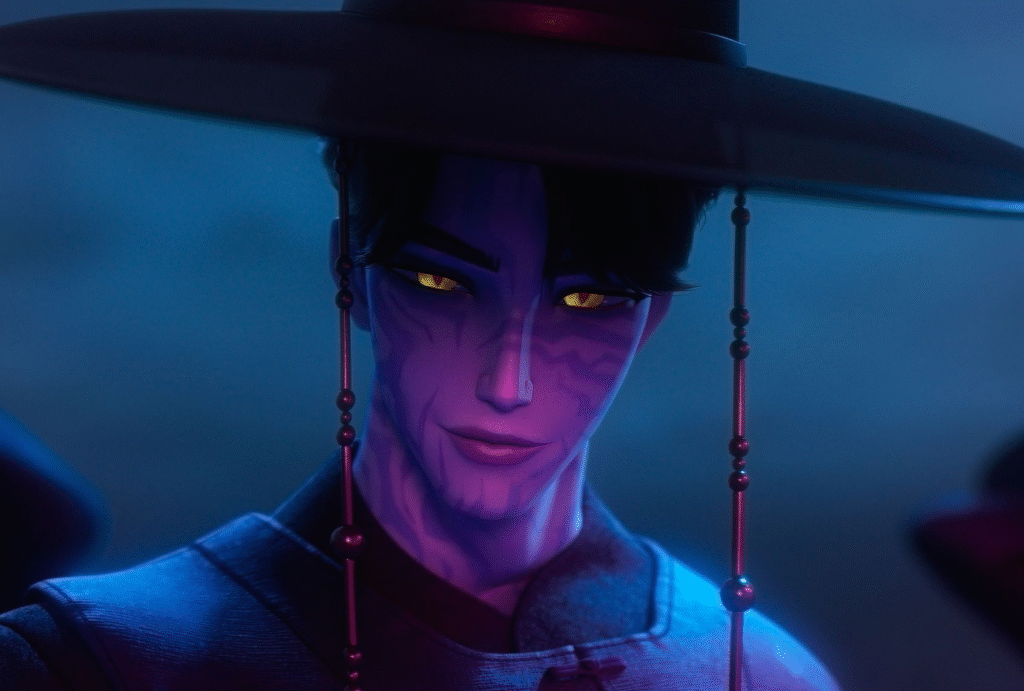Have you ever wondered how much the KPop Demon Hunters cast made from their stunning performances? The animated musical film took the world by storm — combining dazzling visuals, emotional storytelling, and K-Pop energy that captivated audiences globally. But behind all that success lies a big question: what’s the KPop Demon Hunters cast salary like?
Let’s dive deep into estimated earnings, royalty structures, and how much each voice actor might have earned for bringing these colorful characters to life.
Quick Bio: KPop Demon Hunters Cast
| Cast Name | Character | Role Type | Estimated Salary (USD) | Notable Work |
|---|---|---|---|---|
| Arden Cho | Rumi | Lead Voice | $500K – $1M | Teen Wolf |
| Ejae | Rumi (Singing) | Singer | $100K – $300K | K-Pop Vocalist |
| May Hong | Mira | Voice | $250K – $600K | Tales of the City |
| Audrey Nuna | Mira (Singing) | Singer | $150K – $400K | Comic Sans |
| Ji-young Yoo | Zoey | Voice | $200K – $500K | The Sky Is Everywhere |
| Rei Ami | Zoey (Singing) | Singer | $150K – $300K | Dictator |
| Ahn Hyo-seop | Jinu | Voice | $400K – $800K | Business Proposal |
| Ken Jeong | Supporting | Actor | $700K – $1.5M | The Hangover |
| Daniel Dae Kim | Supporting | Actor | $600K – $1M | Lost |
| Yunjin Kim | Supporting | Actress | $400K – $700K | Money Heist: Korea |
| Lee Byung-hun | Cameo | Actor | $800K – $1.5M | Squid Game |

The Hidden Economics Behind the KPop Demon Hunters Cast Salary
When you hear that KPop Demon Hunters had a production budget of around $100 million, you might assume the actors earned millions each. But animation budgets allocate funds differently. A huge portion goes to visual effects, animation studios, marketing, and music licensing — while the cast salary pool typically takes up around 10–15% of total production.
That means the entire voice cast likely shared between $8 million and $12 million, depending on final contracts and bonuses.
How Much Do Voice Actors Get Paid in Such Films?
Voice acting in a global animated musical often includes:
- Base Pay: The upfront payment for recording sessions and performance rights.
- Residuals or Royalties: Small ongoing payments when the project streams or airs worldwide.
- Bonus Clauses: If the film surpasses certain viewership or revenue milestones.
- Music Royalties: Separate for those who perform original songs.
For a feature-length animation of this scale, base salaries can range:
- Lead voice actors: $400,000–$1 million
- Singing performers: $100,000–$400,000 plus royalties
- Supporting roles: $250,000–$700,000
- Cameo stars: $500,000–$1.5 million (depending on fame)
So when you add backend bonuses and music rights, the total earnings of a lead performer could easily reach $1–1.5 million.
Singing Royalties: The Secret Moneymaker
One of the biggest advantages for KPop Demon Hunters singers was their involvement in the official soundtrack. Every time a track from the movie streams, sells, or is used in promotional content, artists receive a royalty share.
For instance, depending on the deal, if a soundtrack album crosses 100 million streams, each performer can earn 5–10% of net streaming revenue. A popular song can generate tens or even hundreds of thousands of dollars per artist over time.
The Role of Fame in Negotiating Salaries
Not all cast members earn equally. Fame, agency negotiation, and prior achievements play a massive role.
- Given their Hollywood credentials, top-tier stars like Ken Jeong, Daniel Dae Kim, and Lee Byung-hun likely received premium rates.
- Rising stars like Arden Cho and Ahn Hyo-seop benefited from international recognition but balanced between K-Drama and U.S. markets, landing mid-six-figure deals.
- Singers with publishing rights (like Audrey Nuna and Rei Ami) might profit longer through music royalties than from the movie’s one-time paycheck.
Global Distribution Bonuses
Some contracts may have included performance bonuses because the film was released globally through streaming.
If KPop Demon Hunters crossed specific milestones (like 100 million global streams or soundtrack certifications), bonuses could activate — between $50K and $250K per lead.
These extra payments reward actors for the movie’s reach and cultural impact.
Why Salary Information Is Kept Confidential
Studios rarely reveal voice actor pay for several reasons:
- Union restrictions – SAG-AFTRA or Korean voice unions bind some actors.
- Nondisclosure agreements (NDAs) – Contracts explicitly forbid revealing compensation.
- Marketing strategy – Keeping salaries private helps the studio manage future negotiations.
- Avoiding comparison drama – Public figures’ pay differences can cause fan controversy.
Factors That Influence Each Actor’s Pay
- Experience & Reputation: Established names command higher base pay.
- Voice + Singing Combination: Artists who perform songs earn more through royalties.
- Global Appeal: Stars with cross-market popularity (like Korean-American actors) bring broader value.
- Character Importance: Lead characters receive a bigger slice of the cast budget.
- Marketing Value: Actors who promote the film on social media often negotiate promotional bonuses.
Hypothetical Example Breakdown
Let’s imagine a mid-tier deal for a lead performer like Arden Cho:
- Base Pay: $600,000
- Soundtrack Bonus: $150,000
- Streaming Performance Bonus: $100,000
- Merchandise Royalties: $50,000
- → Total Estimated Earnings: $900,000
Similarly, a top-tier cameo like Ken Jeong might have earned around $1.2 million, while singers like Audrey Nuna or Rei Ami could make $300K–$500K, including ongoing royalties.
Financial Takeaway
The KPop Demon Hunters cast salary reflects a blend of modern entertainment economics that merges voice acting, K-Pop music, and global streaming contracts.
Even though not all details are public, the film’s combination of star power, creative storytelling, and hit music ensures that the main cast enjoyed six-figure to low seven-figure paydays in total compensation.
Conclusion
The KPop Demon Hunters cast didn’t just lend their voices — they brought vibrant personalities and K-Pop charisma to life. While official figures remain confidential, industry comparisons suggest that main voice actors earned around $500K–$1M, and top stars reached seven-figure totals with bonuses and music royalties.
In the entertainment world, talent meets business, and KPop Demon Hunters proves how animated musicals can redefine what voice acting is worth in 2025.
Whether you’re a fan of Rumi’s power vocals or Zoey’s fierce energy, one thing’s for sure — the cast behind this hit truly earned their spotlight.

FAQs
1. Who earned the most in KPop Demon Hunters?
Ken Jeong and Lee Byung-hun likely ranked highest, earning between $1–1.5 million due to their international fame and premium contract status.
2. Do singers earn more than voice actors?
It depends. Singers receive long-term royalties, while voice actors typically earn one-time fees. Over time, a hit song can out-earn base acting pay.
3. Did Netflix or Sony affect cast payments?
Yes. As global distributors, they structured fixed contracts with capped residuals, so major bonuses were likely tied to performance milestones.
4. Are voice actor salaries public?
Studios and talent agencies keep all salary data private under strict NDAs. Most figures are industry estimates.
5. Will the sequel change salary rates?
Absolutely. If a sequel happens, the returning cast could renegotiate contracts and double their pay based on success metrics.
6. Do Korean and American actors earn differently?
Yes. Korean industry contracts usually pay less upfront but may include royalty bonuses, while U.S. actors prefer fixed, high base pay.
Also, Read The Following: Daniel Tosh Net Worth.


